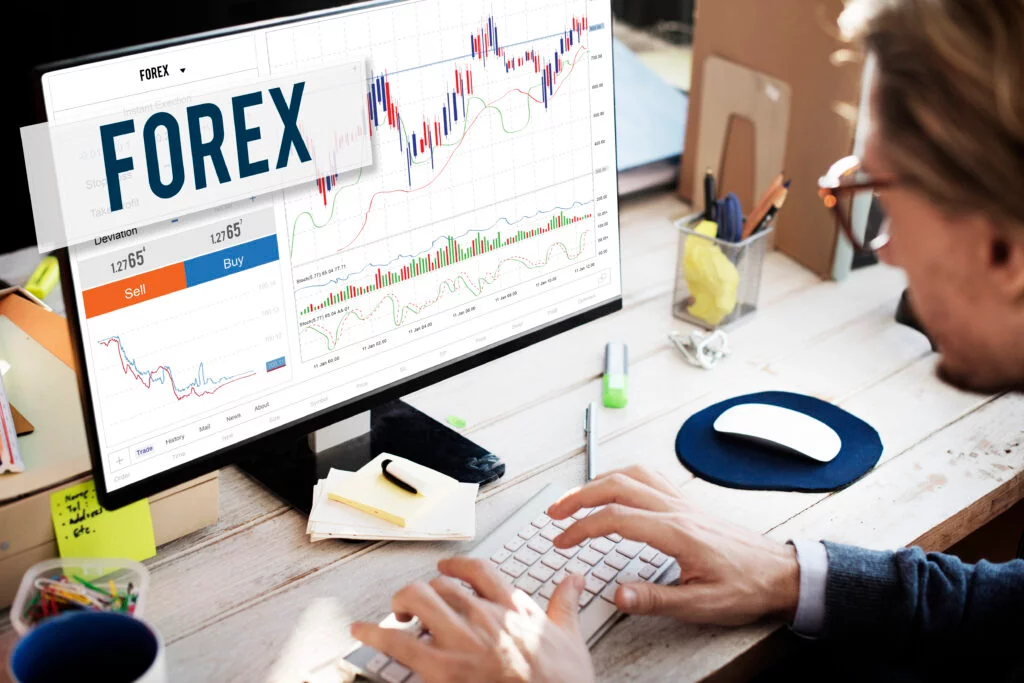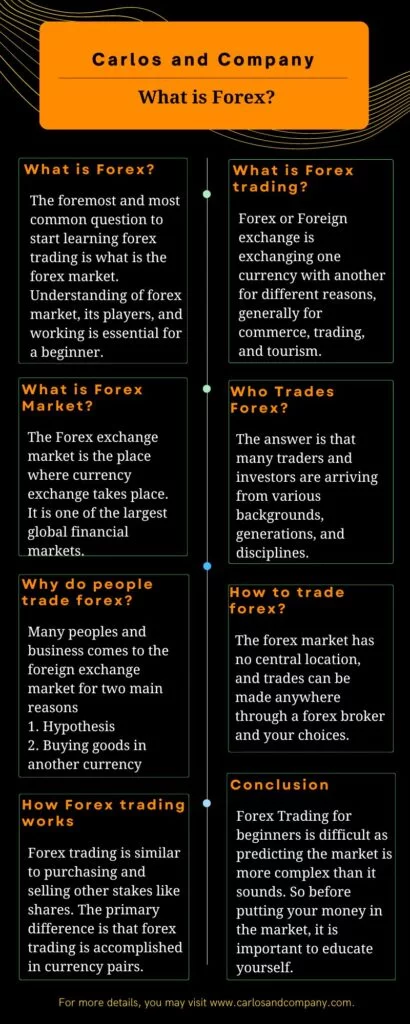What is Forex?
The foremost and most common question to start learning forex trading is what is the forex market. Understanding of forex market, its players, and working is essential for a beginner. Let’s have an overview of what is forex trading and how does it work.
Here's a quick look at what you'll read
Forex or Foreign exchange is exchanging one currency with another for different reasons, generally for commerce, trading, and tourism.
The Forex exchange market is the place where currency exchange takes place.
- Institutional players
- Institutions
- Institutional Investors:
- Essential Forex Players
- Commercial and Investment Banks
- Central Bank
- Investment Leaders and Hedge Funds
- Individuals Investors
Many peoples and business comes to the foreign exchange market for two main reasons
1. Hypothesis
2. Buying goods in another currency
The forex market has no central location, and trades can be made anywhere through a forex broker and your choices.
Forex trading is similar to purchasing and selling other stakes like shares. The primary difference is that forex trading is accomplished in currency pairs.
What is Forex trading?
Forex or Foreign exchange is exchanging one currency with another for different reasons, generally for commerce, trading, and tourism.
What is Forex Market?
The Forex exchange market is the place where currency exchange takes place. It is one of the largest global financial markets and trades trillions of dollars daily. Fx describes as a currency market, and it uses a pair of currencies, price in one versus others.

Over $6.6 trillion costs transactions done every day in the foreign exchange market, which means 100 times more than the New York stock exchange(NYSE), which is the world’s most prominent stock exchange market.
Understanding Foreign Exchange
The market decides the cost of currencies, also understood as an exchange rate. Foreign exchange can be as easy as switching one currency to another at a local bank. It can also include exchanging the currency on the foreign exchange market.
For example, a trader gambling with a central bank will reduce or pull the monetary policy, and one currency will support the other.
When trading, the currency is listed in pairs, such as EUR/USD, USD/CAD, or USD/JPY. These pairs symbolize the U.S. dollar (USD) versus the Canadian dollar (CAD) and the Eurodollar versus the Japanese yen (JPY).
Forex trading example
Let us practically understand what is forex trading with an example. Suppose a trader is trading in CAD/USD. If a trader believes that the value of CAD will appreciate against USD, then he will play long, which means he will buy the player or suppose if a trader believes USD will rise against CAD, he will sell the pair.
In the above example, if the market moves according to the traders’ prediction, he will earn a profit; if not, he will suffer a loss.
Who Trades Forex?
You have to understand what is forex now; the question is who trades in the forex market. The answer is that many traders and investors are arriving from various backgrounds, generations, and disciplines. They all are diverse.
From the brand new person to the financial market to the most standard seasoned forex traders, utilizing forex is one of the most general techniques for participating in the largest financial market in the world.
Viewing the low entry barriers, Everyone needs a computer, internet connection, and brokerage account to start Forex trading. While every individual comes into the forex market with unique objectives, forex traders are divided into two major players.
- Institutional players
- Essential Forex Players
Institutional Players
The most prominent players in the forex market are investors, institutional traders, and institutions. The estimated institutional money account for most foreign exchange trading is approximately 94.5% of the market volume. The word “institutional.” is usually utilized to grasp all the significant market players.
Here is a short brief about Institutions and Institutional Investors.
Institutions:- To prevent systematic risk, the institutions directly buy and sell the physical commodities on behalf of their accounts.
Institutional Investors:- An individual enters the market on behalf of another commodity, party, or fund.
For example, Japan’s Government Pension Investment funds represent the world’s most significant pension funds, granting several private equity managers to invest in its asset portfolio.

Essential Forex Players
Commercial and Investment Banks:-
The most incredible volume of currency trade in the interbank market. It is the market where a bank of all shapes trades currency with each other. The central bank holds a large percentage of the total volume of currency trades.
These banks promote forex transactions for clients and operate theoretical trades from their trading counter. When banks work as brokers for their clients, the bid-ask spread denotes banks’ profits.
Conjectural currency trades perform to earn a profit on changes in currency. Currencies can also offer diversification to a combination of trade portfolios.
Forex trading on Holidays and Weekends
One of the most common questions of forex traders is whether Holidays or weekends affect the market, and the answer is it does affect the forex market. One can trade in all positions during Holidays.
However, if you are trading on holidays, you need to remember that the amount of risk is comparatively more than on weekdays. If you are a beginner in forex trading, then you should not trade in Forex during important holidays as it is very difficult to predict the market due to unreliable signals and trends.
The time of weekends is also regarded as a gap in forex trading. During weekends the forex market remained closed, and no trading took place during that time. However, the change in the price of currencies takes place even on weekends. The values of currencies fluctuate on all seven days of the week, and the forex market opens for five days. Therefore some traders even made strategies to take advantage of these gaps.
Central Bank
The central bank denotes the government nations and is a significant participant in the foreign exchange trading market. If you are wondering who controls the fx market, the answer is the Central banks.
Central banks control the forex market activities in countries where forex trading is legal. Its interest rate policies and procedures impact the currency rates to a massive scope. A central bank is liable for fixing the cost of its home currency on foreign exchange.
This exchange rate control through its currency will exchange in the open trade market. Exchange rate commands are divided into fixed, floating, and types of pegged.
Investment Leaders and Hedge Funds
The portfolio managers, pooled funds, and hedge funds drive the second-biggest group of participants in the foreign exchange market next to the banks and central banks.
The investment leaders exchange the currencies for pension funds, foundations, and endowments. An investment manager must buy and sell the currencies to exchange foreign securities with an international portfolio.
Investment leaders may also create theoretical forex trades, while hedge funds perform theoretical currency trades as part of their investment plans.
Individuals Investors
The most extensive number of forex players, individuals, are liable for only a bit of the overall traded volume. People trade their currency to earn profit from the marketplace like the solitary owner who executes daily business. While in terms of the market, it is relatively short, and people donate to the overall emotion and forex liquidity.
Why do people trade forex?
We have to understand what is forex. Now the question arises why do people trade in forex? Many peoples and business comes to the foreign exchange market for two main reasons
1. Hypothesis
2. Buying goods in another currency
Hypothesis
The vast majority of forex currencies exchange takes place to make money. It means that the individual or any institution creating the trade with no plans to obtain delivery of the currency. They are just looking to earn a profit on market trends.
Powerful financial institutions are still examining to profit from slight changes in forex prices; various large trades can happen throughout the day.
This action means the currency rates are some of the most consistently volatile financial markets worldwide, offering gamblers more options to earn money.
Buying goods in another currency
Despite the various transactions, the traded currency is usually minimal compared to trades created through big gamblers. Therefore commercial trading manages not affect short-term market rates significantly.
How to trade forex?
Forex trading is not like share trading; it is an OTC market. It means that currencies are exchanged instantly between two people instead of via an exchange.
The forex market has no central location, and trades can be made anywhere through a forex broker and your choices. It indicates that you can trade in foreign exchange anytime because the forex market operates electronically via a worldwide network of banks.
Forex trading operates 24/7 as long as it happens during trading hours in one of the four main forex trading centers, such as London, New York, Sydney, and Tokyo.
You can trade most forex pairs from around 21:00 or 22:00 (U.K. time) on Sunday to 21:00 or 22:00 (U.K. time) on Friday every week. The exact duration can change due to daylight saving time changes in the U.K., USA, and Australia.
How Forex trading works
Forex trading is similar to purchasing and selling other stakes like shares. The primary difference is that forex trading is accomplished in currency pairs, such as USD/JBY or GBP/USD in forex trading.
When you trade in forex, you sell one currency and purchase another. You earn a profit if your buy currency rises against the currency you sell.
For example, the exchange rate between the Japanese yen and the U.S. dollar is 2.40 to 1. If you buy 2,000 euros, you will pay $2,400 U.S. dollars. If the currency rate later rises from 2.50 to 1, you can sell those yen for $2,500, earning a profit of $100.
Conclusion
We have learned about what is forex trading and all the important aspects of the process. It is one of the best ways to make a big amount of money. However, the risk is also associated with fx trading.
Forex Trading for beginners is difficult as predicting the market is more complex than it sounds. So before putting your money in the market, it is important to educate yourself.
